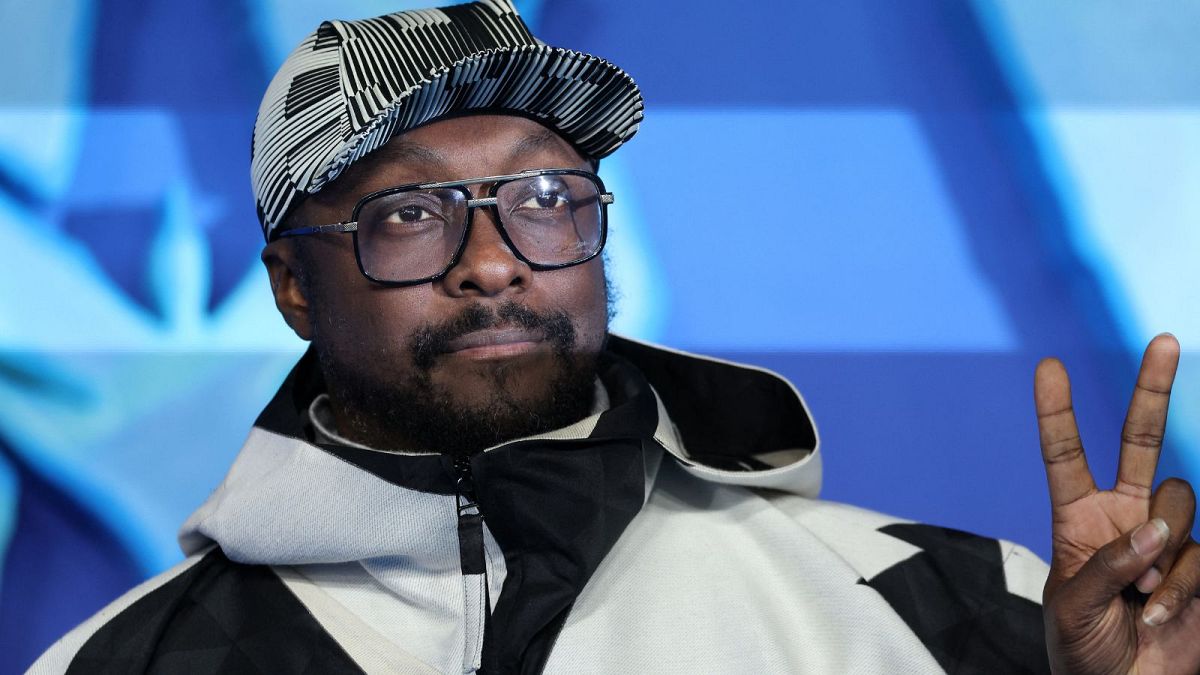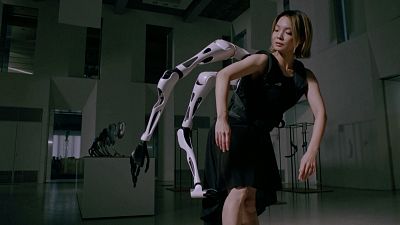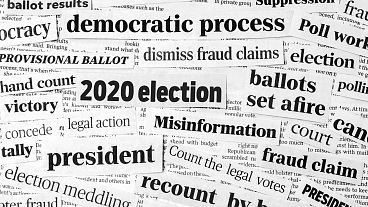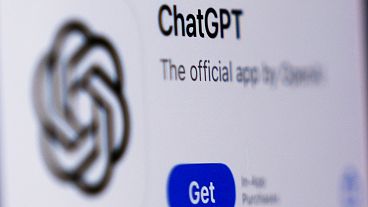In an exclusive conversation with Euronews Next, will.i.am talks AI, the future of creativity, and his new AI-powered platform to “co-pilot” creation.
The epitome of a Renaissance Man, will.i.am (born William Adams), the prolific singer, songwriter, rapper, actor, producer, DJ, entrepreneur, and philanthropist, has added another feather to his cap: futurist.
And his latest endeavour serves as another testament to his forward-looking mindset.
The founding and lead member of the Black Eyed Peas has launched FYI (short for Focus Your Idea), billed as “the first productivity tool designed to serve creatives first”.
The FYI app is engineered to help creatives in a wide array of tasks, including AI-powered “creative co-piloting,” chatting with collaborators and team members, sharing photos, videos, audio files, and docs, as well as securing data “with the most advanced end-to-end encryption”.
Jonathan Mildenhall, former Chief Marketing Officer of Airbnb and co-founder and Chairman of TwentyFirstCenturyBrand, says he is particularly excited about the launch of FYI because it has a similar founding story to Airbnb.
Brian Chesky and Joe Gebbia, the founders of Airbnb, were inspired to create their home renting platform when faced with a sudden rent increase for their New York City apartment. To overcome the financial challenge, they decided to rent out their spare bedroom, sparking the idea that would revolutionise the way people travel.
Similarly, Will, confronted with the limitations imposed by the pandemic and the lack of suitable tools for remote creative collaborations, decided to take matters into his own hands and embarked on a mission to find a solution - the answer was FYI.
Products out of necessity “are a gift to the world,” said Mildenhall, who’s developing the brand strategy for FYI.
In the context of the Cannes Lions Festival of Creativity, Euronews spoke to will.i.am about the potential and implications of the future of AI, music and creativity.
Camille Bello, Euronews: Will, who do you think will be using FYI?
will.i.am: “So the creative community was working across six different tools up until FYI existed. We were on WhatsApp. To work off WhatsApp, you need a Dropbox. If your files were too big, you need to WeTransfer. But if you can't open it up on WhatsApp, you need to send that Wetransfer to emails, you need email, you need a calendar, and you need Zoom and then a chatGPT.
So you need seven things for creatives to get work done remotely on a phone on fire. For FYI you just need one tool called FYI.
The key ideal customer is the hyper-creative, the person that is ideating, putting teams together or small teams. And with AI, small teams become big teams.”
CB: How is FYI different from the other language models, such as ChatGPT?
will.i.am: “FYI a messenger first. It's a messenger with your file management and your digital asset management storage. [All] connected to the messenger, because why should your conversations around your digital assets, the projects that you're working on, be separate from where your teams and your communication plan strategy are?
So it's a messenger digital asset management file storage. It's a calendar, a music organiser, and a generative AI for team flow.
It's a messenger from the perspective of project-based collaboration, project-based ideation, and materialisation with AI to help you.”
CB: Tell us about the algorithm behind FYI.
will.i.am: “I can tell you about the work that we're doing with IBM as far as the business of creativity.”
Right now, if you're creative and you have an idea that you want to start, but you want to protect that idea before you go, reach out to folks, that's kind of impossible.
“[Especially] if you're from some inner city or some from some rural area or living in the suburbs.
And so on FYI - in collaboration with IBM and WatsonX - in the near future, you're going to be able to create a thread and evoke your FYI business agent to create an NDA to protect your idea…without having to worry about how you find an attorney or afford an attorney to do the basic thing - that is protect and do business while you create.
First we're starting with basic NDA idea of protection, IP protection, and then will grow from there.
And we invite the creative community to be on the journey with us. The whole premise of the product is to champion the creative, support them, and protect them and their IP and their data by issuing elliptical curve cryptography keys that we worked with IBM to ensure that everything is protected. Soup to nuts.”
CB: Amidst the ongoing debate on the convergence of AI and music, and in response to a fake Drake track, trip-hop collective Massive Attack tweeted: "Is the discussion 'should AI recreate music?' or is the discussion 'Why is contemporary music so homogenised & formulaic that it's really easy to copy?'
CB: What do you think of that?
will.i.am: “For anything to get good at something, it has to reference and copy something. And AI is already great at mimicking paintings, illustrations, marketing plans, strategies…but it also creates.
I've heard amazing creations that AI has made of music that sounds like something that I would have written, that sounds like me, and some people would be convinced that I did it, that I sung it. And it wasn't a recreation of something. It was something from scratch. And it will continue to get better. How do I feel about that? I feel that regulations need to be put in place around essence and likeness ASAP.
I urge every person that's working in the AI space, every person that works in governance and regulation and setting protection protocols for people and humanity: essence and likeness is important…Fighting for people's likeness, people's essence, protecting people and their civil liberties and their communities. That is what we should be doing. We're not saying regulations to stop innovation. We're saying, I'm saying, regulations for people.”
CB: Do you think it's a bit premature the way in which we are adopting artificial intelligence - before there is an actual regulation put in place that we can follow?
will.i.am: “That's hard to say. That's like saying when the automobile was invented, the Department of Motor Vehicles (DMV) was around. Fact is, no; That's like saying when the aeroplane was invented, the Federal Aviation Administration (FAA) was already around. The answer is no. But now that there's flight, now that there's vehicles on the road, I think it's time for the Department of Motor Vehicles and the FAA to ensure people are safe and the communities that they live in.”
CB: You come from a multicultural background. Are you concerned about the algorithm bias?
will.i.am: “The only way to tackle bias is to have people from different communities and different backgrounds training data and writing algorithms. And I've been super passionate about this subject for the past decade-plus. That's why I have a school and a program in East Los Angeles, Boyle Heights, with ‘todos los mexicanos de mi barrio,’ and we teach them computer science, robotics and programming so they can grow up and fill jobs that are needed to address data, biases and algorithmic biases. That is my core passion.
You can go out and ensure that companies address these biases. Or you can go out there and you could do work and adopt a school and encourage kids to go down this path.
And to the folks that are working in that space, it's not that they're malicious and they don't want people of colour to train models. It's set up from the school systems and the zoning from the get-go because there's not a computer science program in every school, but there's a basketball program or a football program or soccer program in every school, but no engineering or algorithmic programming or data training program mandatory in every school, inner city, rural area, poverty-stricken area, underdeveloped community, underserved community.
Is it the folks that made the model where they're like, ‘mwahaha’, ‘we're not going to’ ‘we don't want?’ No, that's not the case, there are engineering gaps.
The world needs more engineers. Where is the engineer going to come from?
Now there's engineering for engineering. Now there's an algorithm that can engineer for us, but that still doesn't address the data bias, that still doesn't address the algorithmic bias. So the only true way, like I said, is to have people of colour, black and brown and women and trans and gay and LGBTQ plus training models, writing algorithms. That's the only way. I started 12 years ago with 65 kids. Now we serve 14,000 students in L.A.
I put STEM programs in inner cities. That sounds like something to do. Why? Because they're not doing it. And when you don't have STEM programs in inner cities, you have data bias, algorithmic bias.”
CB: Are you concerned about a future in which machines will be doing all the creative and fun work and humans just prompting machines?
will.i.am: “No, because I believe in humanity's creativity, spontaneity, curiosity and competitiveness. I believe in that.
Just like calculators out-calculate mathematicians, that doesn't mean people aren't doing calculations. That doesn't mean people aren't building structures and, you know, working with advanced mathematical models. People are still thinking. People are still trying to solve problems. It's just an amazing tool. But that's not going to stop our innovative spirit, our ingenuity, inventions.
Right now, in popular culture, the word is ‘innovation’. ‘Invention’ hasn't been said or talked about in a long time. This new renaissance is going to spark new inventions, not innovations. This next leap is like we're going to invent things. Not just innovate.”



